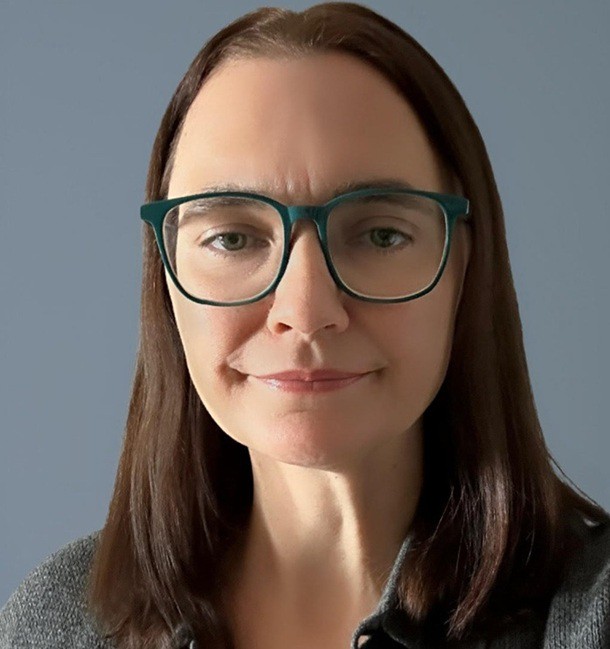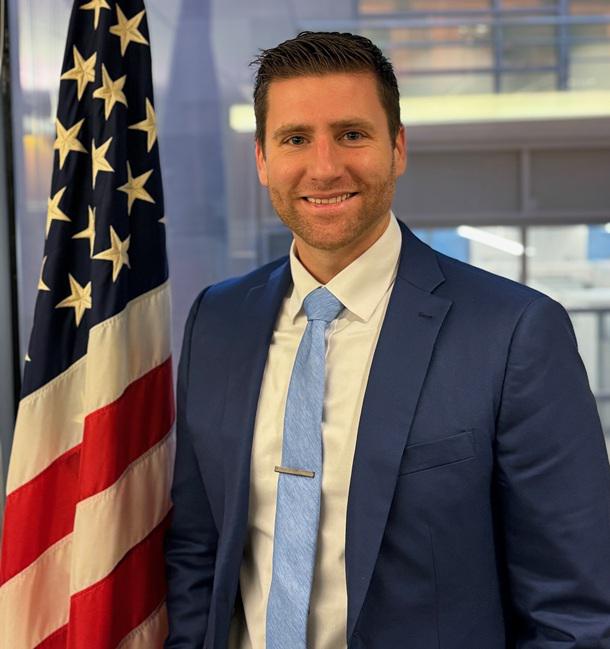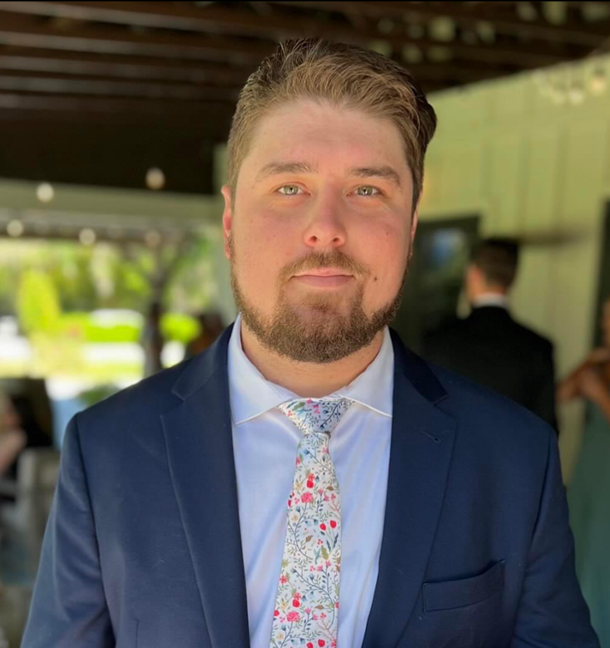Get to know the 2024 Rising Stars

sakchai vongsasiripat/Getty Images
These winners have demonstrated leadership and commitment to how government serves the American people.
Each year, Nextgov/FCW selects a cohort of emerging tech talent across federal, state and local governments — as well as the members of private industry that support them — that demonstrates what it means to serve the public with excellence early in their government careers.
The 2024 winners are no different, having led projects in automation, customer experience, data sharing and more that impressed colleagues and users alike. They demonstrate not only the greatness that can be achieved by early-career talent, but also the potential that talent holds as they progress in their work.
We will honor that talent at a Cocktails and Conversation happy hour event on December 12 at the National Union Building, but first we'd like to offer a glimpse here into the work that made these Rising Stars standouts.
Jessica Bailey

Jessica Bailey has been a standout Contract Specialist at the General Services Administration in the Information Technology Category Office of Interagency Acquisitions. She performs pre-award procurement functions and leads cost and price analyses for the Polaris Small Business Governmentwide Acquisition Contract program. Her dual roles, serving as both the lead Contract Specialist for the Polaris Small Business Pool and the head of the Polaris Cost/Price team, exemplify her ability to take on critical responsibilities and drive success.
Jessica’s work has had a transformative impact on the ITC’s contract management processes, particularly through her leadership in the development and refinement of the proposal management tool for Polaris. Her thorough review and feedback during requirements development and user acceptance testing ensured the software was effective and aligned with GSA’s needs, ultimately creating a more efficient solicitation process for small businesses.
“Being acknowledged for my hard work and dedication motivates me to continue pushing boundaries in my career and also encourages me to inspire others. I am excited about the opportunities ahead!” Bailey said.
Anthony “Tony” Boese

Tony Boese oversees several programs at the Department of Veterans Affairs, but his work with the department’s All-Services Personnel and Institutional Readiness Engine — or ASPIRE — program has earned him particular praise.
The artificial intelligence-powered tool helps assess and upskill federal personnel, and Boese has been credited with developing and expanding ASPIRE. The initiative is now used by multiple federal agencies, nonprofits and private sector partners.
“AI is a rapidly evolving technology and the federal government has struggled to take a comprehensive approach to address it; yet Tony has excelled, going above and beyond by leveraging careful negotiation skills to successfully navigate the federal AI ecosystem,” his nominator wrote.
Boese is also an alumni of the Presidential Management Fellow program and heads VA’s Precision Brain Health projects.
“Despite his limited federal tenure, Tony has quickly become recognized as a subject matter expert within AI in the federal government,” his nominator wrote, adding that “he also orchestrated the founding of and wrote the charter for the Federal Responsible AI Official’s Council and led that group through its first year.”
Zachary Bogart

In Zachary Bogart’s career transitioning from contractor to a federal employee at the State Department, he has helped to helm the agency’s IT modernization in significant ways, such as working on the agency’s Software Asset Management program to automate processes and cut the software request process from weeks and months to just hours. His work has supported artificial intelligence, machine learning, cloud modernization, application development and IT service management efforts.
“Since he has started as a federal employee, he is constantly seeking out how to improve the organization, increase the knowledge gathering and training for other [contract officer’s representatives] within his office,” his nominator wrote.
Bogart said his broader goals in his current role are to continue centralizing State’s IT acquisition arm while improving the department’s emerging tech purchasing posture as tech evolves.
“It's really rewarding from a contracting officer representative perspective to see the end customers and citizens being able to be impacted by some of the buys that are going on through my specific office,” Bogart said.
Gabby Burke

Gabby Burke is the driver behind Colorado’s new social health information exchange called CoSHIE, a statewide network that integrates social, behavioral and physical health data among providers in Colorado. Officials believe it is the first project of its kind in the nation.
CoSHIE will help providers view data — like when a person last received a health screening — to plug service gaps and reduce duplicate processes, Burke said. It will also help streamline the referral process so providers can link people on Medicaid with other services to offer more holistic care.
It took Burke less than a year to pull together dozens of partners to get on board with the project. And she’s already working on ways to ensure its long-term success, like leveraging AI to improve data integrations among CoSHIE partners.
CoSHIE’s first use case, Burke said, is to help Colorado’s Medicaid agency transition people from long-term care facilities back into their communities.
“It's been a very long road, and I’m really excited to see what comes next,” Burke said. “I think this is one of the most community-driven technology efforts that I've seen in government, and I'm really just proud of what our office has been able to accomplish.”
April Harding

April Harding has only been in government for a just over a year, but she’s already made an impact by drawing on her 20-plus years of private sector experience.
She built and now leads a team of over 50 feds and contractors that create and optimize digital products and services.
The goal is user-friendly online products. To get there, Harding has driven a cross-functional approach to guarantee that user, customer and employee experience are integrated into strategic planning, business goals and more. The shift to user-centered design has also been impactful.
Her work “has helped the agency move from a tech-centric lens to a user-centric, taxpayer first lens,” her nominator wrote.
“The most powerful thing we’ve done so far is simply defining our vision for the digital experience,” said Harding via email, noting that she’s “grateful to have been recognized for my work to transform the taxpayer experience by introducing and implementing a strategic framework for end-to-end digital service delivery.”
Brittaney Harkness

Brittaney Harkness excels at making applications the public can use to get vital information about their community.
“She has a keen analytical prowess which gives her an advantage in designing applications that SHE would see as useful. Brittaney puts herself in the shoes of the user and always has them in mind when creating tools that can have an impact,” her nominator said.
Harkness took the lead in creating the Cook County Social Vulnerability Index application, which helps policymakers determine where resources like COVID-19 vaccines are needed most. She also championed a service to help residents find their city council, county board, judicial, state legislative and congressional districts just by entering their address. And Harkness spearheaded an effort to provide demographic data about areas in Cook County over time — a valuable resource for elected officials identifying needs and for county employees applying for grants.
Harkness makes ease-of-use a priority, even if that means creating her own applications instead of using off-the-shelf technology and incorporating Spanish language components.
“The thing that I strive for is, if my grandmother can sit down and use it, then I think I’ve accomplished something,” Harkness said.
Matthew Mudrak

As the lead mechanical technician for the Orion program, Matthew Mudrak has played a vital role in the assembly, testing and review of NASA’s most advanced fleet of spacecraft.
His technical expertise helped enable the Artemis I Orion mission to conduct a successful flyby of the moon in November 2022, and has also helped pave the way for the Artemis II mission to take astronauts to the moon and Mars in the coming years.
“Matthew’s commitment to NASA’s human spaceflight efforts is unparalleled,” his nominator wrote. “He continually goes above and beyond to ensure the NASA team is able to showcase the agency’s return of human spaceflight launches to the United States.”
Mudrak — who worked his way up from an apprentice to the program’s shift mechanical lead — said his career choice was influenced by his father, who was one of the retrieval scuba divers recovering solid rocket boosters from NASA’s space shuttles.
“I would not be where I am without the selfless help of my family and the people within this program wanting to see the younger generation shine. Receiving this award is an honor and I will cherish it for the rest of my career,” Mudrak said.
James K. Oliver

Maj. James Oliver has already established himself as a key educator, mentor and leader since joining Army Program Executive Office Enterprise Information Systems in February 2023.
Oliver assists with the development of the Army Training Information System, which provides on-demand training to soldiers across the world. He has spearheaded efforts to engage over 160 users in its design and development and has also led internal educational sessions to spread Agile best practices.
In addition to briefing senior Army officers on some of the challenges faced with adopting Agile, he has also shared his expertise through lunch-and-learn sessions and other educational opportunities.
“Shortly after he joined PEO EIS, leaders of the organization’s data portfolio approached him about making a workforce-wide presentation on ATIS’ Agile approach and lessons learned,” his nominator said. “From that time forward, he has become a much sought out expert and proactive mentor to dozens of PEO EIS programs undergoing the transition from waterfall to Agile software development methods.”
“That makes me very proud to be part of this organization,” Oliver said. “Receiving this award is affirming and it motivates me to continue improving myself and my organization.”
Gabe Paley

New York is looking to digitize many of its government services and improve the customer experience, and Gabe Paley is at the heart of many of those initiatives.
Under Paley, the state was among the first to partner with the Internal Revenue Service to allow eligible residents to file their taxes for free through the Direct File pilot. He then helped create the state’s first-ever chief customer experience officer position to help bring learnings from that pilot to other areas of government.
That investment in customer experience, Paley hopes, should help New Yorkers more easily access benefits and other services, and reduce what the state calls the “time tax” associated with those interactions.
“All the work that we're doing is such a team sport,” Paley said. “It has to be a collaboration, not just across state government, but also across city government, across the federal government. People don't necessarily know what level of government they need to interact with to get a certain service, whether it's to renew their passport, get a new driver's license or call in a sanitation issue on their street.”
Nicholas Pettini

Nicholas Pettini has dedicated his entire cybersecurity career to the Army, with a clear and unwavering mission: defending the Department of Defense Information Network-Army from cyber threats. For Pettini, the work is personal: it’s about protecting the warfighters whose data is critical to the success of their missions.
One of his most notable contributions involved leading investigations that directly resulted in classified Named Operations, drawing the attention of senior Army leadership and sparking remediation efforts across the Army’s enterprise network. Beyond the Army, these efforts resonated with other organizations, prompting broader remediation actions. Additionally, Pettini played a key role in strengthening ties with the intelligence community, closing critical gaps and providing defenders with better, more actionable intelligence.
“It feels great to be recognized for the hard work I've put in over the years, and I'm very grateful to be honored in such a way,” he says.
Danielle Rowell

Danielle Rowell has spent nearly two years at OPM, and in that time, has made a remarkable impact on the agency’s cybersecurity efforts. Her role on the agency’s cybersecurity team is fast-paced, but she thrives on the constant challenge.
“Rowell successfully stabilized a team suffering from high attrition, lack of cohesive direction, and low productivity,” her nominator said. “She is also well known for her ability to bring teams together on projects when they initially did not see eye to eye on next steps.”
One of Rowell’s standout achievements was leading an initiative that cut the team’s cybersecurity budget by $4 million, all while keeping the infrastructure robust and secure. This move wasn’t just about trimming costs — it laid the groundwork for investing in cutting-edge technologies, allowing OPM to stay ahead of emerging threats and secure the agency’s future.
“I am extremely honored. To be recognized and appreciated for the work I do day in and day out is what continues to motivate me to go above and beyond every day,” Rowell said.
Samira Sadat

Samira Sadat led the redesign of vote.gov — a federal website that directs people to state election sites for voting information. It launched this summer with a new content management system, as well as an additional 17 language options.
It was soon put to the test, when global pop superstar Taylor Swift backed Kamala Harris via Instagram after the presidential debate in September and shared a link to vote.gov. That link sent over hundreds of thousands of people to the site.
Her nominator says that the site has helped over 4 million people so far this year, emphasizing not only Sadat’s work itself but also her commitment to sharing lessons learned across GSA, as well as her focus on accessibility.
Sadat joined the vote.gov team as a U.S. Digital Corps fellow, but now is a permanent member of the team.
“I am so grateful that as a software engineer, I didn’t have to choose between growing technically in my career, and making a social impact,” Sadat said. “I am humbled that I get to build and release features on vote.gov that make an impact for millions of Americans.”
Dr. Sheina Sim

Working within the U.S. Department of Agriculture, Dr. Sheina Sim leads research efforts in sequencing genomes of beneficial and pest insects in American agriculture.
Sim’s expertise has enabled whole genome assembly through development and use of state of the art pipelines that are implemented on high performance computing infrastructure.
“Despite having the challenges of building a fresh research program from the ground up, Dr. Sim has devoted countless hours to building two international research efforts ‘AgPest100’ and ‘Beenome100’ that aim to describe the genomes of all of the key insects in agriculture, from crop pests to beneficial pollinators,” her nominator said. “She does this with immense skill but also kindness and an incredible sense of humor (there are endless puns for ‘bee-ing’ in this line of work but she seems to find still more).”
Sim’s day-to-day includes conducting experiments and doing bioinformatic analyses, but in the coming years she aspires to rise toward a senior scientist designation.
“I can imagine doing what I’m doing until I retire,” Sim said. “It’s hard work that is at times very stressful, but it’s very rewarding, and I’m glad to have a team of people to work with where we can struggle and have fun together.”
Kira Tebbe

Kira Tebbe came into government in 2022 through the U.S. Digital Corps. Since then, she worked at the Office of Refugee Resettlement before becoming a founding member of the Administration for Children and Families’ Digital Service.
Her nominator says that Tebbe has what it takes “to excel as a civic technologist in government.”
Tebbe worked to overhaul a case management system — as well as associated policy and guidance — at ORR to help the office ensure the care of unaccompanied children by tracking significant incidents, or situations that may affect the child’s safety. The redesign enabled broad improvements to child protection, program integrity and operational efficiency.
“I think a lot of willingness for change and willingness for innovation is there. Often, what's missing … is the lack of structure and opportunity for that change to happen,” said Tebbe. “If I put the structures in place and put the organization in place, people often will come along for the ride, and then good things will happen as a result.”
Alyssa Zeutzius

In the last year, Alyssa Zeutzius has been a leader in helping New York State prepare its first-in-the-nation cybersecurity rules for hospitals after several high-profile breaches, and updating its cybersecurity regulations for the financial services industry. And as part of the effort to bolster whole-of-state cybersecurity, she was on the team that rolled out endpoint detection and response service to every New York county under its shared services program.
There’s more to do, too, including a push to update water cybersecurity requirements and fighting cybercrime, especially that which targets elderly New Yorkers.
“A lot of the work that we do as public servants and government in general is not always glamorous, it's not always publicized,” Zeutzius said. “Certainly, in cyber, you can talk a lot about the things you're doing and the programs you've established, but there's not really a lot of data to show what incidents you've prevented. If you're staying out of the news and there's not any incidents, then you've done well.”





